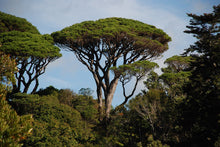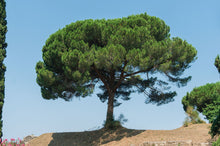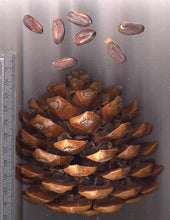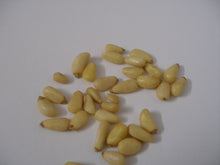Italian Stone Pine (Pine Nut)
Regular price
$4.50
Sale
Pinus pinea
Origin: Italy
Improvement status: Landrace
Seeds per packet: ~10
Germination tested 08/2024: 75%
Life cycle: Perennial
We are very excited to be offering these very special imported Italian stone pine seeds this year. We haven't met a pine nut we don't enjoy, but there is something extra special about the Italian pinoli nuts, famous for their use in Italian pastries and as one of a few key ingredients in the classic pesto sauce. Italian stone pines are not only delicious, but stately and beautiful trees, with an iconic umbrella-like shape. Unfortunately these trees are only reliably hardy to Zone 8, so they won't grow well in most of the US, but we do think it's worth trying them in parts of Zone 7, especially as the planet continues to warm. Additionally, Italian stone pine makes an excellent bonsai tree — and if you wait long enough, you might even get one to produce some nuts!
These seeds were imported from Italy by our friends at Sheffield's Seed Company in Locke, NY.
GROWING TIPS: Seeds can be sown without any form of pre-treatment. They will quickly produce a strong taproot so should be sown into containers at least 4 inches deep (but preferably more). Cover the seeds with half an inch of good soil or compost and keep well watered until seedling emergence (after 10-14 days). Once the seedlings appear give them plenty of light, but not full direct sun. Fungal diseases (damping off) is the biggest threat just after germination (other than rodents, which are a threat from planting until the seedlings become well established). Damping off can be avoided by not overwatering, reducing watering frequency, and keeping the seedlings somewhere with good air circulation and low humidity. Organic fungicides like neem oil or sulfur or copper might help if all else fails. Even once established, do not over-water these trees! Remember they come from the Mediterranean, so they like a warm and dry climate.
If you're trying to push the zone boundary with these plants, we recommend growing them in a deep container for the first two or three years. Protect from weed pressure and mammal predation until well established in their permanent position.
NOTE: Cone image comes from MPF and is available under a Creative Commons Attribution-Share Alike 3.0 license. The sprouting seed image is from Pdreijnders and available under the same license.








